#Is he related to The Watchmaker?
Explore tagged Tumblr posts
Text
I really need to know more about Misha...
#hsr#spoilers in tags#Is he related to The Watchmaker?#if so then in what way?#is he his grandson?#IS he The Watchmaker????#(I mean Mikhail -> Misha?? + his technique stopping time?)#though I guess the grandson theory seems more plausible#since his voicelines mention his grandpa whom he's waiting for...#also him and Gallagher both mention each other...#also his line about Clockie being real and ''not just a character I made up''? 🤔#anyway yeah
8 notes
·
View notes
Text




One HSR Character a Day Day 33: Misha
#honkai star rail#misha#hsr edits#revsdailyhsr#i say he's destruction because he certainly wrecked many peoples hearts in 2.2. i mean i figured from previous patches that he#had to be related to the watchmaker in some way but i wasnt expecting it LIKE THAT. ohh this poor lad.
3 notes
·
View notes
Note
hii :3 for ur 1k event, can I request a fic or hcs of sunday w a shy s/o which likes physical affection a LOT? fine w fluff or hurt/comfort!! love ur writing <3

feather light touches

synopsis - what happens when someone who loves physical affection meets someone who doesn't?
includes - sunday
warnings - gn!reader, slightly angsty, comfort, fluff, wc - 897
a/n: hii :3 thank you!!!

sunday was a public figure. head of the oak family and at the will of the watchmaker, anybody who had even heard of penacony probably had heard of him. while he did manage most of the affairs of penaconians in his office, he was a well known face - mainly due to him making sure he could accompany his sister to her performances and personally greeting very important guests.
to maintain such a high profile position, sunday had no room to be shy nor anxious when it came to anything. he needed the ability to communicate with and sway anyone to his whims and so he needed to show no signs of weakness. perhaps it was maybe helped by the fact that he did have quite the desperation for control and so to achieve that, he needed everybody to see him as the confident and formidable person he was.
as a result, alot of his relationships were strictly business - in a way every business relation he built up was built up to his benefit, to keep him in control and eventually elevate his status. he needed to be in control to succeed and so he never took up opportunities that made him feel like his control would diminish and leave him scrambling for his power. by extention, sunday wasn't exactly the kind to enjoy physical affection, if anything he despised it. of course there were exceptions to a degree, namely his sister and you.
you were like a complete polar opposite to sunday. he was confident and an influential figure that liked keeping people at arms length, even those he was close too. you were a shy and reserved person who craved nothing more than to be close to those you held dearly. physical affection was very dear to you but unfortunately the shyness was an obstacle that prevented most forms of physical affection - unlike sunday who would take any opportunity to stay away from any kind of physical contact.
sunday didn't mind how shy you were, it didn't really matter to him as he enjoyed your company nonetheless. he didn't mind doing things for you and so if your shyness did prevent you from talking to people he'd gladly step in. your shyness was actually a great comfort to him at the end of a day filled with business dealings, just to spend his evening with you indulging in smalltalk and relaxing without the pressure of being the head of the oak family.
it wouldn't take sunday long to notice how hesitant you could get in private, you always looked like you wanted something but you never said anything and so he didn't know what to do. if something was bothering you, you probably would have told him know no? truth be told, your issue wasn't so much your shyness when it came to physical affection but more with how unsure you were with sunday's willingness to just that.
you knew for a matter of fact that physical touch and affection wasn't exactly sunday's deal, so you're shyness was overcome with worries that he wouldn't understand your love for physical affection. you started fearing that this would be the reason you couldn't stay with sunday, that this would be the breaking point of your relationship. what made it worse was that you never brought it up. you were way to shy about it to bring it up and so you say on the issue.
that was until sunday started picking up more ideas to what was causing your hesitation around him. he noticed how a simple act of hand holding made your face light up even if you didn't mention anything, so unconsciously he started doing that more. sunday realised you were very fond of physical affection and maybe you were just hesitant that he wouldn't appreciate it.
it was true that he was uncomfortable with most kinds of physical affection but maybe he could try and make an exception for you - he really couldn't bare seeing you so pained because you couldn't ask him. simple acts like hand holding, that still made you light up, were bearable with him to start as long as he still wore his gloves but you didn't seem to mind. maybe just maybe he could atart building up his tolerance just for you.
or maybe he couldn't deny you when he realised you built up all your courage just to ask him for a hug. sunday fully understood now, he knew for sure that you lived physical affection but you were simply too shy to ask for such. albeit he probably didn't help you by seeming so off put by physical affection but he just had to prove to you that you were indeed an exception - so long as you still let him get used to more physical contact.
it all seemed worth it in the end to him. seeing your face light up when he offered a hug, a small kiss, or even hand holding made his day, what really made it worth it for him was seeing you becime more comfortable with asking for the physical affection you lived oh so much. it may be foreign and slightly uncomfortable to him but he'd be willing to build up that aspect if it meant helping you in the process.

akutasoda's 1k event
#↪♡akutasoda's 1k event ♡#—stellaronhvnters.#x reader#x gender neutral reader#honkai star rail x reader#honkai star rail x gender neutral reader#honkai star rail x you#hsr x reader#hsr x gender neutral reader#hsr x you#hsr sunday#honkai star rail sunday#sunday x reader
442 notes
·
View notes
Text
FL-inspired book recs!
brought to you by hotel wi-fi
Locations
The Royal Bethlehem: “The Yellow Wallpaper” by Charlotte Perkins Gilman, and “The Room in the Tower” by E.F. Benson. these are short stories, not novels, but they are fairly quick reads and are about locations where reality becomes twisted. the yellow wallpaper deals with mental illness and medical neglect, while the room in the tower is more about the overlap between dreams and the real world.
Port Carnelian: Mycroft Holmes by Kareem Abdul-Jabbar. ok, hear me out on this one. if you’ve ever thought port carnelian would be great if it actually dealt with British colonialism and racism in a meaningful way and also had a murder mystery, you might like this book. a much younger Mycroft Holmes goes with his friend Cyrus Douglas to Douglas’s home in Trinidad to investigate a series of mysterious deaths.
Ladybones Road: The Watchmaker of Filigree Street by Natasha Pulley. Nathaniel Steepleton finds a gold pocket watch in his bedroom one day, but he cannot open it or even hear it ticking. six months later, it opens on its own, and an alarm goes off at the precise time that a bomb explodes in Scotland Yard. he then goes in search of its maker, Keita Mori, who claims the watch was stolen from his shop. Mori has a gift for elaborate clockwork, and though he seems kind and relatively harmless, Nathaniel is sure he is hiding something.
Ambitions/Major Storylines
Early Light Fingers: The House of Silk by Anthony Horowitz. it’s a Sherlock Holmes pastiche, but it can still be understood and enjoyed even if you don’t share my Sherlock Holmes autism. I specified early light fingers, because the mystery of what exactly the house of silk is, and the theme of corruption in highest levels of society, reminds me a lot of exploring and learning about the orphanage. just a heads up, this book is centered around a murdered child, and deals with the systemic abuse and neglect of children in victorian london. its biggest content warning is also its biggest spoiler, so I won’t give it here, but feel free to ask me. I had it spoiled for me on accident and still liked the book a lot.
Late-game Nemesis: “The Moonlit Road” by Ambrose Pierce. another short story, it recounts in three parts the murder of Julia Hetman, as told by her son, her husband, and Julia herself. it specifically reminds me of the dreams of the dead section of nemesis.
Evolution: Into the Drowning Deep by Mira Grant. Tory Stewart becomes obsessed with mermaids after her sister Anne’s disappearance. Anne was filming a mockumentary about mermaids in the Mariana Trench, but the ship she was on disappeared, and was recovered weeks later with no trace of the crew. footage was found that appeared to show the crew being murdered by mermaids, but it’s largely believed to be for the movie, not real. seven years later, Theodore Blackwell recruits Tory as part of his mission to return to the Mariana Trench and capture a live mermaid. it hits sort of the same spot for undersea survival horror that the diving bell section of evolution did for me.
Exceptional Stories
The Bloody Wallpaper: Sign Here by Claudia Lux. hell is an office. literally. Peyote Trip sold his soul while he was alive, and now works in hell, convincing other people to do the same. he’s one deal away from a big promotion, and all he needs is the soul of one last member of the Harrison family. normal laws of space and time don’t apply, the real hellscape is capitalism, and secrets don’t stay hidden forever… sound familiar? in terms of violence and body horror, I don’t think it gets much worse than the text of the bloody wallpaper. one of the main characters does have a pretty brutal backstory involving christianity-related child abuse though.
Totentanz: Gods of Jade and Shadow by Silvia Moreno-Garcia. set in late 1920s Mexico, the story follows Casiopea Tun and the Mayan death god Hun-Kamé on a journey across Mexico and eventually into the underworld. Casiopea finds Hun-Kamé’s bones in a chest in her grandfather’s house, and when she cuts her finger on one of the bone shards, Hun-Kamé becomes bound to her. together, they must find the rest of his body, which has been scattered around Mexico by Hun-Kamé’s brother Vucub-Kamé, who took over control of Xibalba from him. Hun-Kamé intends to retake Xibalba, but he and Casiopea must face sorcerers, demons, and twisted family dynamics- and that’s before they even get to the underworld.
#aelan speaks#fallen london#book recommendations#pleaseeeeee feel free to come talk to me about any of these or request more recs#i love books
96 notes
·
View notes
Text
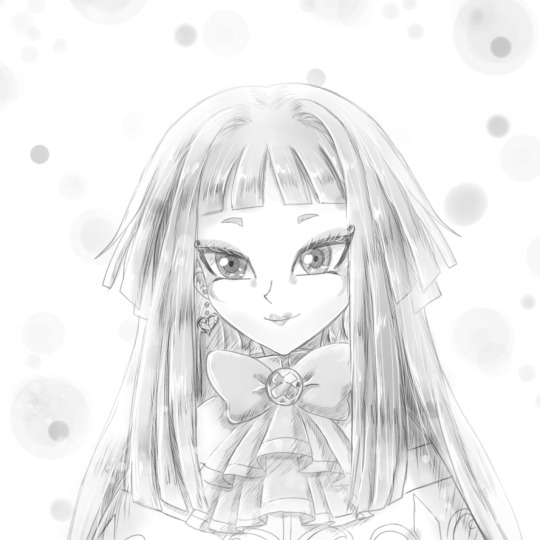
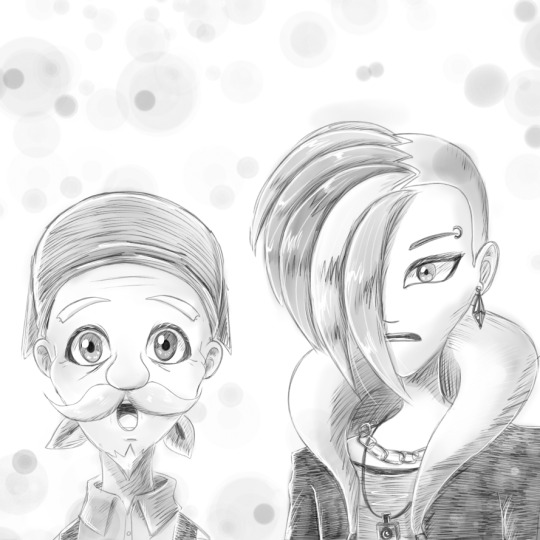
"Tell me it's you, young lady."
"Yes, it's me, Ali...no, the possible Alicia in your timeline.
Dominic, despite Alicia's new look, could recognize her perfectly, specifically, Alicia's sweet, soft gaze, being now, Tempo.
"Tell me it's you, young lady."
"Yes, it's me, Ali...no, the possible Alicia in your timeline.
"So... I traveled to the future?"
"No dear. This place exists neither past, present nor future of anyone. But it's also not impossible for you to compare it as something like that."
Yejun, who was so confused, that the rabbit-faced woman was so attractive and moreover, she would be the sensitive young girl he met a while ago.
"I don't understand. Is she Alicia? I don't think so, that irritating personality of that big woman? Is this a joke?"
"Refrain from your words, young man. The theft you performed much trouble you have caused."
As the two watchmakers argued with Tempo, Lance just stared, wistfully, especially at Tempo and Dominic.
"You know them, Lance?" asks Balan as he sees Lance's face.
"Back in my day when Balan(ce) was, Mr. Clockmaker was in my charge. He was the closest person Alicia ever had in WonderWorld. That watch that Tempo has, that was the gift the mister gave her."
"Wow, you know a lot."
"Just Alicia told me about it. And I won't forget that smile she had...and I could never give."
King Negati ducks his head, not taking his mind off his failure to sway Alicia's heart.
As the two humans argue with the lady, Dominic notices two tall, thin men.
"And you are maestros too?"-Dominic asks, stepping closer as he sees the two.
"I see you don't recognize me, my estimable Mr. Dominic Leggero."
Balan, Tempo and Yejun are impressed by the surname of the man already revealed.
Yejun approaches the watchmaker with astonishment. His admiration grew even more.
"It's you! You really are the genius of mechanics! Your contribution has served a lot to....mrfh!
"You talk a lot" Lance covers Yejun's mouth, he wants to avoid revealing more than unnecessary to the watchmaker, coming from a more delayed era.
"Lance...I guess Mr. Dominic... "Balan mutters in surprise.
Lance nods his head as he directs his gaze to the rabbit lady.
"Yes, he is the direct ancestor of Christopher Leggero, your best friend."
"Chris..." Upon hearing the name of her best friend and beloved man, a small smile tugs at the lady's lips.
"If he's my descendant, then he must have this funny index finger inward, or not?"
Tempo looks at Dominic's right hand, and remembers that both Chris and Guido, have that disfigured shape on the finger indicated by the watchmaker.
"Wow, they're definitely related."-Tempo smiles slyly.
"And he's not missing Yejun."
"ª?"
The watchmaker stares at the man.
"This boy also has that malformation. I suspected it when I first met him."
"Sir, but how are you so sure of that?"-Yenjun asks with a distrustful expression, as he felt that because of his origin, he finds it impossible his connection.
"Young man, I am sure, my intuition has never failed me." Dominic expresses very proudly.
"Emmm..." Tempo, upon hearing that word, approaches Dominic with doubts she wishes to clarify. And a slight smile leaves her lips.
"And... your intuition is also... inheritable?"
Dominic is surprised and thinks for a few seconds.
"Ummm, if my great-grandfather and aunt have it...it may be so. But she tells me that relatives who don't inherit that gift can pass it on to their descendants."
"Hehe, I understand."
"?"
"Chris has that gift too. If it wasn't for his intuition, I would have been in trouble when I was a child" A small smile appears as she remembers those moments she spent with her beloved. Her expression changes to one of sorrow and melancholy.
"Do you miss your friend, young lady?"
"Very much."
"I would love to do something for you, tell me what you need."
The maestro didn't hesitate to use that favor, so she looks at the two maestros with a determined expression.
"Balan, Lance, I ask you to please leave this place."
26 notes
·
View notes
Text
Penacony TB 2.1 Impression
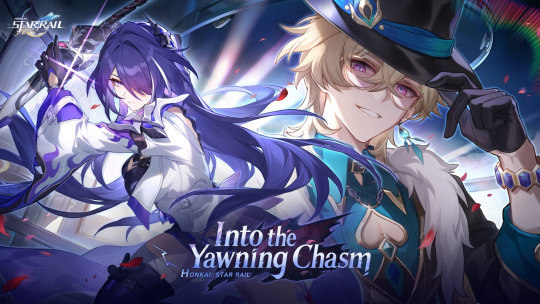
Contains heavy spoiler and mostly a rant so don't read it if you still not finish the story (lol)
Before unto the stories, I must say I kinda get the reasons why hoyo put Acheron in first banner and Aventurine in second half after read TB 2.1. For Acheron, I think her identity as emenator nihility is the key lore to expose before 2.1 began so there's need to expose it at trailer (despite her reasoning coming to Penacony still unknown somehow lol). While for Aventurine, this is kinda delulu on my side but there's possibility we might know the things happened to him after 2.1 from his daily message.
Onto stories, I only say one line... IT'S VERY HONKAI VIBE ! Telling one person stories from they born into the one we know now with angsty vibe of course lol. You know, the things I scare when hoyo release Acheron trailer and myriad celestial is how Aventurine past can beat that honkai queen and (un)fortunately I was wrong (lol)
IT'S FULL BLOW OF AVENTURINE DARK PAST and yeah hoyo score a full mark with it !
For composition I think it's 80% Aventurine PoV and 20% others which is unsuprisingly since I'm pretty sure he will not appear again for future Penacony chapter but what I'm suprise is so far Astral Express basically can't do anything much in Penacony so yeah Xianzhou Luofu TB back again.
Despite that, I'm very happy with TB 2.1 like this is what Honkai story should do ! Up until now, I always thought HSR still not show their full equipment and pretty weak with their story, Tingyun only snapping some head isn't near those previous Honkai heels you know (lol).
I'm going to talk a long rant on 80% since hoyo decided to love him with his so well written stories and I love him too (XD)
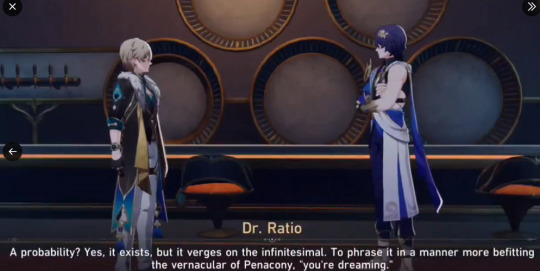
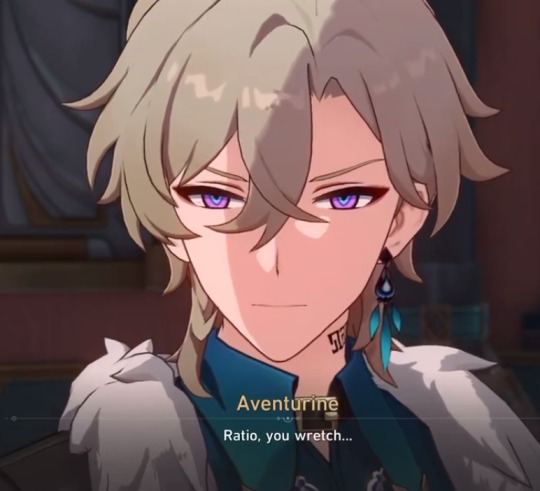
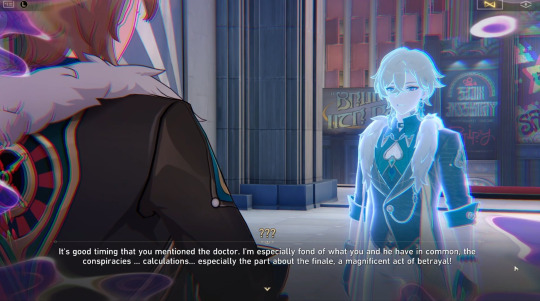
The things with Aventurine and Ratio, I guess this what we would called "same mind don't need talk much". They're bickering so well, even acted betray each others without any communication and smooth enough to fool Sunday
But sorry I'm not getting fool (I know they're soulmate lol), the reason is I found one hole in Sunday Ratio convo here
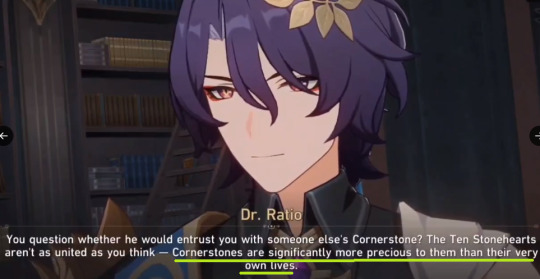
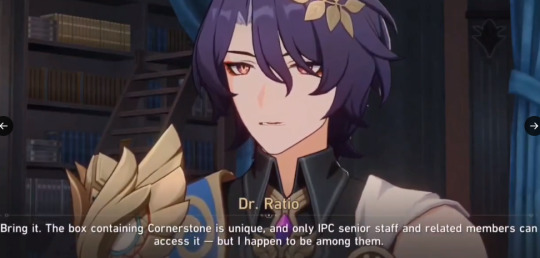
Ratio saying about cornerstone is so precious to ten stonehearts but the box contain can be opened by other than them ? If that's true, I can't believe someone like Aventurine would risk someone like that participate in his grand scheme without reasons... plus Ratio doesn't strike me as someone who sells his teammate or what he called him lol no matter how iritatting he is especially only for pursuing knowledge, since it sounds so idiocy.
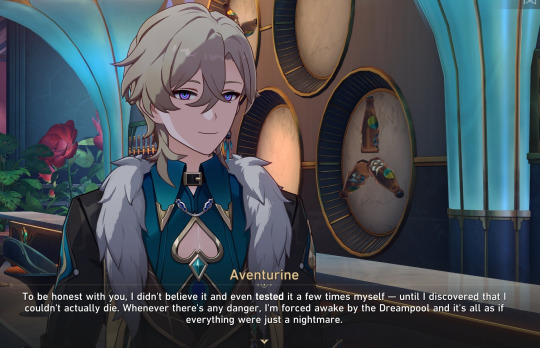
Suprising fact, he even try kill himself few times at dreamscape ! Like is that something you can try out of fun even If knowing you can't die ? Well yeah, in first place he doesn't mind to die anytime but doing it yourself and passive talk are two different things you know...
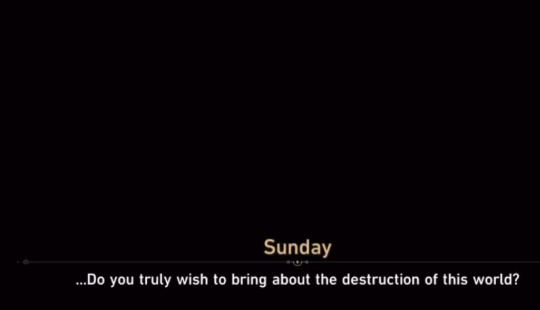
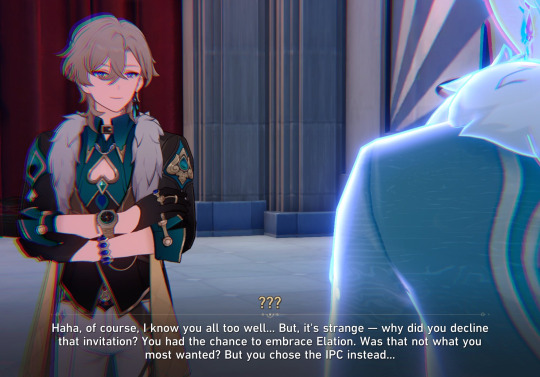
two question I thought Aventurine never answer directly which is pretty related. First of all, different than Sunday which I think he's type of "I will kill everyone and then myself if they hurt my sister" but he's already at own limit to think for his own survival + he doesn't have anyone to get revenge for. Elation still have some excitement when saw someone in despair but I don't think Aventurine (at that time) could feels same, well we don't know things after 2.1 since his past chains severed by Acheron, maybe he will open a new leaf (I hope so, let him live happily ever after with Ratio or Elation or even Trailblazing with us sounds good too lol)
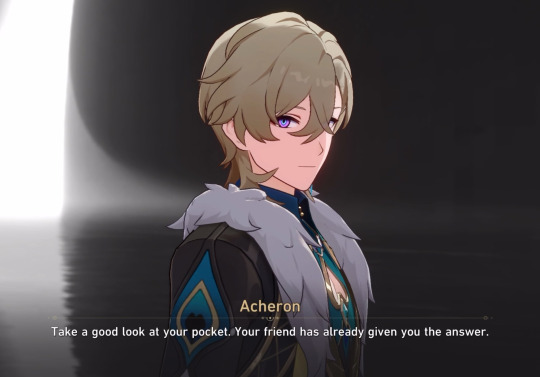

It stabilize the fact that Aventurine and Ratio are good friends despite their talk, voiceline, and teammate voiceline at least from Ratio side which is the vital point Aventurine still alive as now. I really skeptic on his dead or alive status at 2.1 livestream, well mostly I can't believe any Shaoji said that time (plus the fact Gallagher is just a normal bartender lol)
TB 2.1 conclude with opening a new terrain with dreamscape's secrets, the Family and Watchmaker aren't same side, IPC will added another ten stonehearts member to game, a mysterious voice will join the fray. Penacony story so far so good, even their newest branch stories execute nicely but I don't have any excitement anymore now knowing Aventurine not gonna show up anymore (XD).
Now with Aventurine closed his screentime, I think Acheron (her past and purpose coming to Penacony still not reveal much), Firefly Sam (SH motive and she need to pursuading TB), Jade and/or Topaz (replacing Aventurine role) will play a bigger parts for future version
Put aside that, my 220 pull still on waiting for Aven banner ! I kinda had bad feelings about his banner pull, even my relics planar farming still not done even after I started doing it from BlackSwan banner...
#honkai star rail#aventurine#acheron#dr ratio#hsr gallagher#hsr sunday#hsr robin#misha#now I have a problem to think#to appreciate Aven well written story#should I buy this version BP ? lol#I vow to become f2p for HSR until today#now Aven shaking my hollow mind (lol)#even without BP I vow to getting his E0S1
38 notes
·
View notes
Text
ok i dont think this is anything related to the watchmaker and all that stuff, but i think its insane that the Family turns traitors into memory zone memes because the concept of the memory zone memes is just that they were created by the true Dreamscape and from the emotions of those within the Dreamscape
this was from the emoscape with Mr McCoy in Dewlight Pavilion, where he was ordered by the Dreammaster to turn his siblings, who were apparently selling information to the IPC about the Family, into memory zone memes, but now i'm wondering just how many people got turned into memory zone memes for being a traitor
I would have said too that maybe the Family - trying to seek out the traitor and the killer of the first Oak Family Head - framed the Watchmaker and possibly turned him into a memory zone meme as well, but the Family is trying to search for the Watchmaker so that's less likely the case. But I just love seeing how fucked up actually the Family can be AND getting more information about the Dreammaster since there really isn't much of anything
#my only thing rn is like 'WHO IS GALLAGHER REALLY'#but i genuinely have no idea alksjdfalkjh#one post i have in mind to do is a timeline of events in penacony history#but i think whats neat is that this is a generational murder case#in dewlight pavilion the 6 nightingale statues you interact with/that spin around#have descriptions that talk about the first family heads within the family#and specifically the one about the bloodhound family head who was loyal and stayed by the oak familys head#as he bled out/got killed#hold on let me see the exact wording#'when the oak family head was betrayed and left to die it was he that accompanied him in his final moments.'#i think itd be fucked up if the dreammaster decided to lock up watchmaker as clockie LAKSDJFHAL#OR LIKE.#idk i feel like itd be weird if they redid the same concept but memory wiped mikhail being misha but that also wouldnt make sense anyways#because that doesnt explain misha's grandfather who is that.#mikhail. sir. i need more information on you. i think youre neat and fun :(#soanyways !#penacony has not shied itself of its former past#i mean it was clear when they decided to use the jail cells as the main transportation in penacony#but to basically jail 'criminals' into playing parts within their little stageplay of an amusement park#i kept saying 'this is steering towards deadman wonderland vibes' and it. it kinda is LAKSJDHFALKSJ#though. not as gory. but theres MURDER AFOOT#avil plays hsr
26 notes
·
View notes
Text
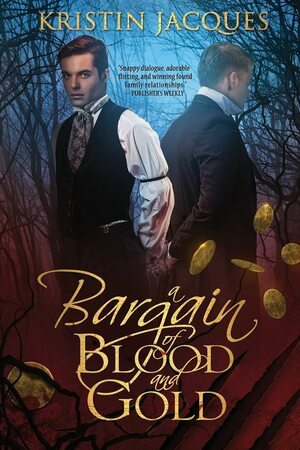

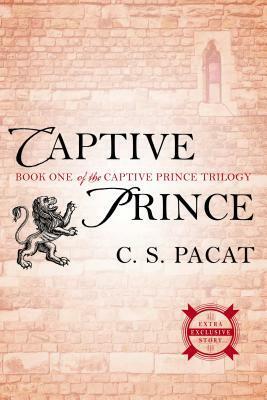
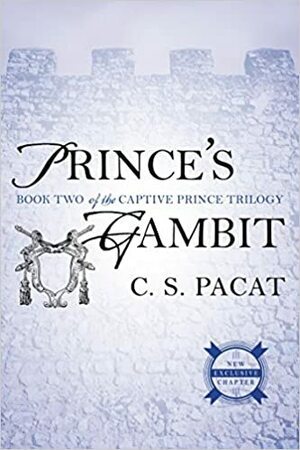
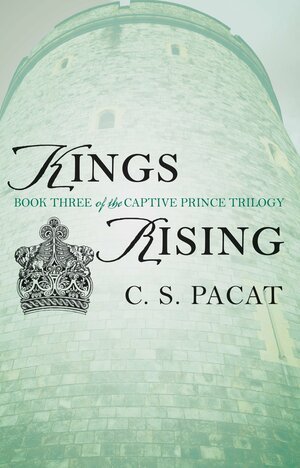

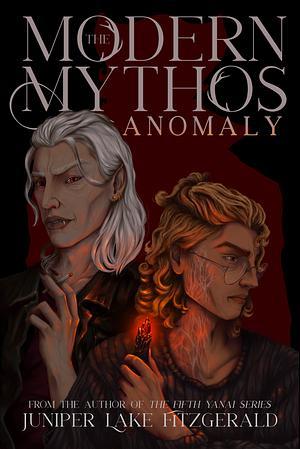
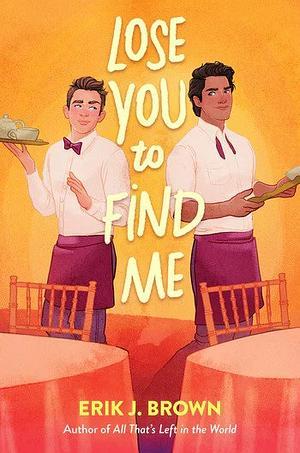


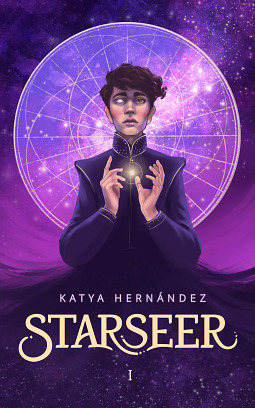

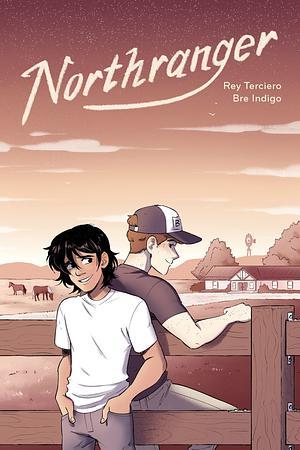
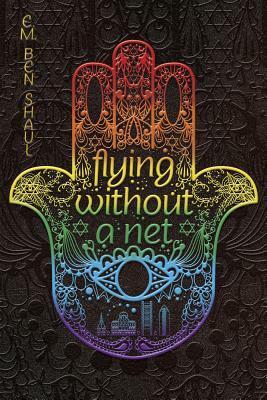

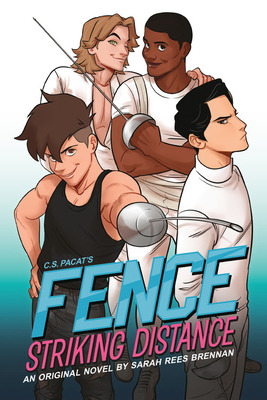
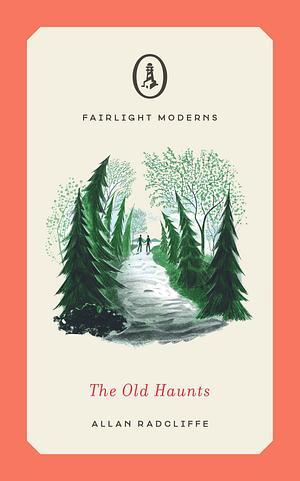

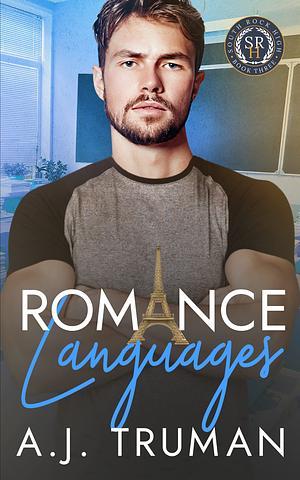


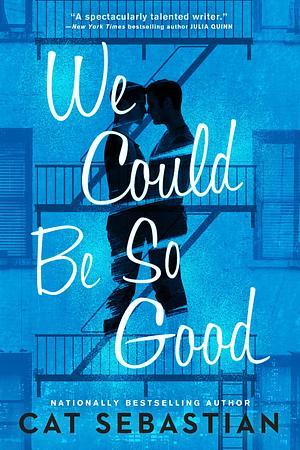


Bargain of Blood and Gold by Kristin Jacques - 3.75/5 stars
Reminiscent of Jordan L Hawk's Widdershins series, but with vampires and werewolves. Also takes place in Maine, which isn't a very common setting. Unwittingly, I bought the second book in the series months ago, and I realized as it got to the top of my TBR that I didn't have the first book! I had to scramble to order it and I was happy I enjoyed it since, obviously, I already have the second book.
Ander & Santi Were Here by Jonny Garza Villa - DNF at pg 2
Captive Prince by CS Pacat (reread) - 5/5 stars
Prince's Gambit by CS Pacat (reread) - 5/5 stars
Kings Rising by CS Pacat - 5/5 stars
I think I loved these books even more on my reread.
Gravity by Tal Bauer - 4.25/5 stars
Probably my favorite hockey romance that I've read.
The Modern Mythos Anomaly by Juniper Lake Fitzgerald - DNF at pg 132
I actually liked the story, the characters, and the writing in general, but this book just needed another few edits to slim it down a bit.
Lose You to Find Me by Erik J Brown - 4.5/5 stars
Leeward by Katie Daysh - 4.5/5 stars
The blurbs on this book are hilarious, because they're all like, tall ships people, and then Mackenzi Lee, hailing it as a lovely queer historical romance. This was a really lovely book and I'm excited for the sequel. Also hoping for more kissing in the sequel since this was a serious slow burn.
Riley Weaver Needs a Date to the Gaybutante Ball by Jason June - 3.75/5 stars
Starseer by Katya Hernández - 4/5 stars
Be Dazzled by Ryan La Sala - 5/5 stars
I loved this book so much!! Oh my god. Super funny, very romantic. It revolves around cosplay which is of course a special interest of mine.
Northranger by Rey Terciero and Bre Indigo - 4.5/5 stars
Flying Without a Net by EM Ben Shaul - 2.75/5 stars
The Watchmaker of Filigree Street by Natasha Pulley (reread) - 5/5 stars
Striking Distance by Sarah Rees Brennan - 4.75/5 stars
I didn't expect to like this as much as I did. The graphic novels were good but changing to a novel format allowed for much deeper characters. Surprisingly devastating and also really funny.
The Old Haunts by Allan Radcliffe - 4/5 stars
The Gay Best Friend by Nicholas DiDomizio - 5/5 stars
Main character is the best friend of both the bride and the groom, and everything surrounding the wedding becomes a train wreck beginning on the weekend of the bachelor party, when the bride asks the MC, Dom, to keep tabs on the groom for her. As someone who is extremely conflict avoidant with friends but not family and romantic partners, I heavily related to Dom. There's also a romance that I really loved.
Romance Languages by AJ Truman - 4.25/5 stars
I think this was my favorite of the South Rock series. It deals with some more difficult topics—Julian's self-loathing over his body image is heartbreaking (and relatable), and Seamus's guilt over the way his gambling addiction hurt his ex was very well done. I'm a sucker for stories where a character learns to ask for help, not to mention difficult parent-child relationships, and this had both. I also appreciated Julian's arc re: sex and virginity.
Darkhearts by James L Sutter - 5/5 stars
Another bandmates-in-love treasure, with a twist—the main character, David, left the band right before they got famous. He ends up falling for one of his ex-friends/bandmates after they reconnect. The author is a musician himself, and it definitely shows (in a good way). I'm really a sucker for The Burdens of Fame, which this book definitely had, but there's actually a really good arc for David and how he deals with his jealousy and resentment over being left behind. Plus he wants to be a carpenter rather than go to college, which was cool.
Brute by Kim Fielding - 4.25/5 stars
We Could Be So Good by Cat Sebastian - 5/5 stars
What can I say about this book? Why was it so lovely? Why did it make me feel so much? Why can I not rate things higher than 5 stars? It's a million stars in my heart. Aside from just being a gorgeous mid-century America m/m romance (my favorite), this one features an Italian-American main character. The stuff with Nick's family was spot-on. I just loved this book. I felt like I was wrapping myself in a big, comfy, historical gay romance blanket.
Drowned Country by Emily Tesh - 5/5 stars
The sequel to Silver in the Wood. Had a very mythic and sort of folk horror vibe. This one is from Henry Silver's POV instead of Tobias Finch's and takes place two years after Silver in the Wood, which is time that Henry has mostly spent sulking in Greenhollow Hall, sans Tobias. Really highly recommend this duology. Emily Tesh is a treasure.
The Alchemy of Moonlight by David Ferraro - DNF at pg 11
#bargain of blood and gold#kristin jacques#captive prince#prince's gambit#kings rising#cs pacat#gravity#tal bauer#leeward#katie daysh#be dazzled#ryan la sala#fence#striking distance#sarah rees brennan#the gay best friend#nicholas didomizio#romance languages#aj truman#darkhearts#james l sutter#we could be so good#cat sebastian#drowned country#greenhollow duology#emily tesh#reading tag
38 notes
·
View notes
Text
22/30 An old man, allegedly
(Previous) | (Index) | (Next)
⛬
We return once again to that movie I wish to send the gift of a single tribble, Prometheus.
Yes, the movie’s gotten around to a twist it’s been clumsily foreshadowing for much of its runtime: Ol’ Man Capitalism, AKA Peter Weyland, is in fact alive and on the ship. I’ve been informed this was a relatively late addition to the plot, according to the available script drafts. His inclusion makes a stab at some themes. Let’s see how they do.
Content warning for deliberately gross old feet, weird religious imagery, death mention, Holloway mention.

Yes, David’s discovery of a living Engineer has meant it’s time to take Weyland out of the tupperware and reheat him for a bit. And it means we get to see Guy Pierce in the flesh, under a pile of old man makeup.
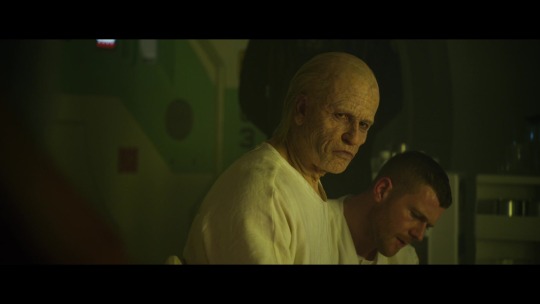
Weyland looks no less weird than he did as a hologram. In fact, he possibly looks weirder, because we no longer have that excuse for why he looks like this. Weyland is very frail, and very frail people’s appearance can change rather drastically in ways that aren’t usually put to film, but frankly, he looks more like Grima Wormtongue has been giving him investment advice.
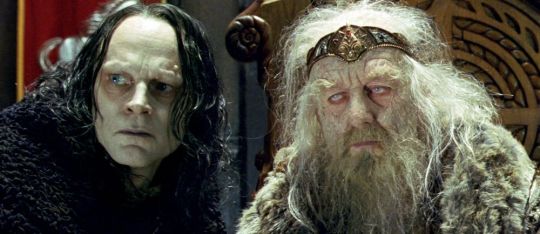
Weyland is here because he thinks the Engineers can stop him from dying. I’m not certain he’s not already expired, and I’m also not sure where he got that impression. There’s a missing step of logic here, which the movie never mentions, but it’s likely related to the assumptions of christianized worldview: if something is the creator of humanity, then it must also have ultimate power over human life and death. Therefore, appealing directly to it can grant you eternal life. The cosmic watchmaker can replace your gears and keep you ticking indefinitely.
I will go along with this framing for just a bit, particularly because this scene is obviously reaching for some biblical imagery I’ll try and tackle in a moment. When the movie remembers to have characters engage with its themes, there are various reactions to the potential of meeting humanity’s creators.

Shaw is positioned as a true believer, but what that actually means to her is extremely unclear. She has some curiosity about the details of creation, so she’s not buying tickets to the Ark Encounter or whatever. She assumes welcoming and benevolent intention from the Engineers, but there’s never any indication of what she intends to do here, beyond prove herself right.
She’s also christian, and she thinks the christian God ultimately created the Engineers. How does that fit into her cosmogony? She has to be the sort of christian that takes Genesis as allegory, but what does it mean that humans were shaped by another species in their own image? Are humans more faithfully created in the christian God’s image than the Engineers were? Does she think the Engineers have souls? Are they angels?
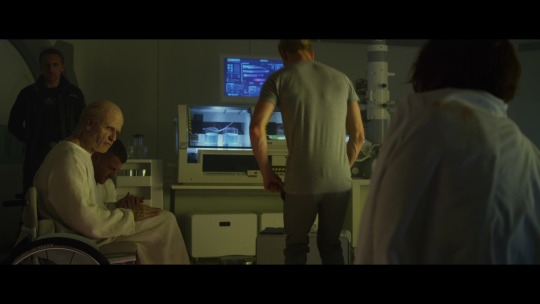
We get no opinion on any of that from her. We don’t even see much of anything about how her apparently strong faith affects her life, beyond having a family keepsake and having belief in things. Holloway at least had an explicit goal in mind–it was a hubristic goal, but it was a goal. He wanted to get all his questions answered about life, the universe, and everything, answered personally, rather than letting anyone else get there first. Finding out the Engineers were dead immediately took the shine off of that, seemingly because he’d thought they were omnipotent and omniscient, despite being positioned as an atheist in the dialog.
Holloway’s position here was odd, particularly for an alleged scientist. He expresses that the creation of life turned out to be “nothing special” during his drunken funk. This echoes common misconceptions by deeply religious folks about how atheists and/or scientists think: the idea that if you’re so set on finding natural, rational explanations for everything, you’re doomed to view the world without wonder or beauty, just chemicals bouncing around for no purpose. That to seek the logic behind the world is to fling yourself into total anhedonia.
As many others have stated before, that’s not what comes out of it, what they’re describing is in fact called “clinical depression.” Understanding more technical details about how the world works doesn’t take the awe out of it, it makes it even more amazing. I’ve excitedly rambled to people that if sequencing tech was cheaper and easier, I’d love to study the genetics and epigenetics of weeds growing on dirt roads, to find out what makes them different from their cousins living only a few feet away in less crappy soil. The existence of a tuft of grass in dusty gravel is endlessly fascinating to me, and I know just enough about them to want to know more.

But no, Holloway’s behavior is common in depictions of atheists by religious people who fundamentally don’t get that one can exist around religious folks without secretly thinking the same way they do. It’s doubly weird, given how surface-level Shaw’s faith is, in a way that also seems to be written by somebody who doesn’t understand the concept too well.
In any case, Holloway got pre-disappointed in the answers he didn’t get, to the very basic philosophical questions he wanted to ask: why were we made? Do we have a purpose? Those sorts of things. Honestly, he could have had more complex things to say about this, even without dislodging his bro persona. Being a bro does not negate the possibility of thoughtfulness, it just means that thoughtfulness might be expressed differently. I didn’t see the movie doing that with him.
The only other potentially intentional thing it was doing with him is using the sum total of his behavior as a negative example: don’t question these things, it’ll lead you to despair and death. Not sure if they meant that, but the rest of the movie uses the punitive morality of some slasher movies as part of its basic structure, so it’s not an impossible read.

Skipping over David for now and going to Weyland: he’s all about what the Engineers can do for him. It’s a gesture toward people who approach christianity from a transactional angle. Faith in exchange for something. There are definitely people like that out there. A lot of premillennial dispensationalist evangelicals fearfully cling to the belief that, as long as they say the right words, they’ll bodily ascend to heaven and leave everyone else behind for the Antichrist, conveniently skipping that unpleasant “death” thing they don’t want to face.
For those who grew up with that stuff or those brainrotted enough like me to remember it, yes. Yes, I am comparing Peter Weyland to Tim LaHaye. The dialog in this movie is bad enough that it makes me think of Left Behind.
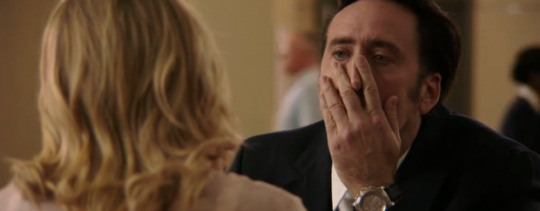
All of this stuff positions the Engineers as either equivalent to the christian god, or to the imperfect gnostic demiurge who is mistaken for a god. But frankly, the Engineers seem more like they were trying to make a sourdough starter, but the last time they opened the fridge, it’d grown fuzz and smelled awful. They were ready to throw out their project.
Was there a heavy ritual aspect involved in their actions? Sure. But the movie hasn’t sold me on the idea that they are themselves acting as christian allegory, only that christian allegory is being placed on them by others.
Speaking of Weyland and more christian stuff, he’s getting his feet washed by David.
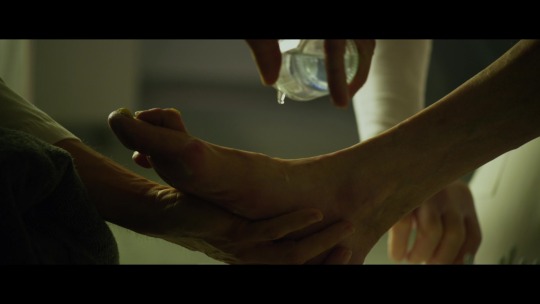
Must be maundy thursday. Foot washing before entering a dwelling is a practice that started as a practical act in a sandal-wearing culture, and became one of power dynamics and religious symbolism. Water would be provided, or a host would wash the feet of a guest themself, or, if they were rich enough, a servant or slave would do the washing. This is very much the dynamic as far as Weyland is concerned. Weyland believes in souls, David, by his estimation, does not have one, therefore he serves humans.

Of course, foot washing also has connotations of humility, and is strongly associated in christianity with Jesus washing the apostles’ feet after the Last Supper. David has certainly and consistently shown himself to be more competent at everything he does than the other characters, and they wouldn’t have gotten this far without him. He’s working on a level they aren’t, even if he’s still forced to be humble about it. If this is the reading we’re meant to reach for, David’s managing a complicated double-act as Jesus (he’s going to be killed for the sins of man yet rise from the dead pretty soon), and also Judas (he is hella jazzed to betray somebody to their death).
In any case, Shaw tries to convince them not to wake up the Engineer. In response, Weyland essentially goads her about Holloway’s death and her beliefs: “And what would Charlie do, now that we’re so close to answering the most meaningful questions ever asked by mankind? How can you leave without knowing what they are? Or have you lost your faith, Shaw?”
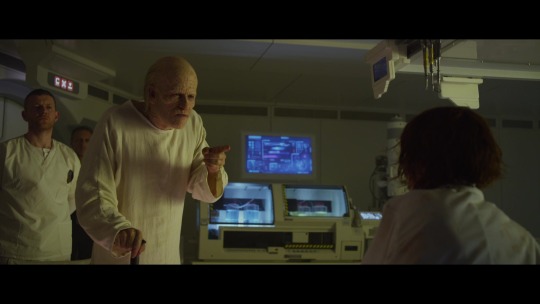
Yes, indeed, Weyland, WWCD. Once you determine that, you do the opposite, and you’ll never be steered wrong.
So of course Shaw decides to go with them.
⛬
(Previous) | (Index) | (Next)
⛬
Alt-text rambles
https://wheelchair.spinergy.com/collections/wheelchair-everyday/products/lite-extreme-lx
https://youtu.be/7h8zJHywjAw
https://www.patheos.com/blogs/slacktivist/2015/11/05/left-behind-index-the-whole-thing/
https://www.slashfilm.com/503786/first-photo-and-video-footage-from-robert-zemeckis-a-christmas-carol/
Overflow Ramble #1
I’m in wait-and-see mode on Fallout one right now. I’m not personally a FO:NV person, so I don’t have special attachment to the West Coast stuff, but I see what they were *trying* to do, even if it didn’t land with me at all (TL;DR playing a queer character felt especially bleak thanks to a lack of underground queer culture in the face of the homophobia).
The trailer looks good, there’s conflict between the BoS and NCR, which hopefully means both factions are going to be the absolute, incurable disasters they should be. Goggins playing a ghoul who helped sell the lie of the Vaults is good, and he’s a damn solid TV and character actor. Dale Cooper and 80s!Paul Atreidies himself Kyle MacLachlan plays the vault overseer, so that’s fun. I’m not a TV person so I don’t recognize the rest of the cast, but I’m hoping it manages to be something good. We’ll find out in April, by which point I’ll hopefully be fREE OF THIS MOVIE
Overflow Ramble #2: Tribulation Force
Close-up of Nick Cage deep in his “paying the bills” phase as Rayford Steele in Left Behind (2014), looking precisely as enthused as he should be, to be playing Rayford Steele. I chose this reaction image because I am not subjecting anyone to flashbacks of the older movies with Kirk Cameron in them.
Want to know how I know too much about this stuff, despite literally spending my childhood thinking people just entertained the idea of Jesus the way they did Santa Claus around the holidays?
Because of a blogger by the name of Fred Clark, who decided one strange day in 2003 to write a thorough dissection of the Left Behind books (cite 3). Thankfully for his sanity, he lost steam eventually. …When Tim LaHaye died in 2016. All fear and respect to Fred Clark.
⛬
(Previous) | (Index) | (Next)
⛬
#Prometheus 2012#Prometheus (2012)#this was entry 19 or 20 a week or two ago#And then I found more stuff to ramble about and so I had to restructure#I thought it was going to end at 25 but that's definitely no longer the case#w e l p
30 notes
·
View notes
Text
Updates to Concept
// My writing process for Gallagher has been something of an experiment, so I've been making changes and trying new things continuously over the past 6 months. I haven't really made any official notes about it, but at this point, he's far enough away from my initial concept that I thought I should bring up the changes for those who might still think I'm writing him that way. Especially with the lore event and the potential to interact with new and old faces on the horizon.
This all, of course, is subject to change over the next several months now that Mr. Reca has been officially introduced and I wait for hoyo to prove or disprove a connection between them.
(Some mild 2.2 and 2.6 spoilers below)
First off, now that we know that Mr. Reca was likely the director for the Penacony main story, this opens up the possibility for Gallagher, as a virtual character, to have been created by Mr. Reca specifically for the story with the Trailblazer, and that Gallagher doesn't have any real connection to Mikhail or Penacony's history. This would mean that everything about him, not just parts, is completely fabricated and that he's basically Mr. Reca's OC for his Penacony fanfic. Cool concept, however, this possibility has me screaming into a cup (/neg) when it comes to RP.
None of my current HCs involve this theory. I'm simply putting it here as a disclaimer in case you see me completely rebuilding my concept for Gallagher in 3 or 4 months.
Changes in bullet format:
I'm no longer writing Gallagher as an avatar for an off-screen History Fictionologist. From now on in my writing, italics won't denote this faceless History Fictionologist's thoughts or make any sort of separation between character and creator. Gallagher is simply Gallagher.
My current concept is that Gallagher the character and Gallagher the History Fictionologist are one and the same. His persona and history are half fabricated, his appearance is entirely fabricated, and he's the figure responsible for creating the story about the Watchmaker and his legacy. A new NPC (Ligeia) in Paperfold Academy talks about "a group of History Fictionologists" kidnapping Sunday, and while this rumor is about Sunday disappearing from the Grand Theater and not from Dewlight Pavilion, the fact that the Death of the Crow readable that she references is found in Dreamflux Reef in 2.2 instead of the Grand Theater gives me reason enough to believe that the "group of History Fictionologists" is indeed Gallagher. Likewise, this now gives a steadier foundation for connecting him to other instances when a "group of History Fictionologists" is mentioned, such as the attack on the amusement park. For the record, I don't necessarily think that "Gallagher" is an individual or a collective. I believe that these rumors are just imperfect reflections of "his" influence.
Related to the above, I write Gallagher akin to a spirit of Penacony. The person we see in the story is 1) Trailblazer privilege and 2) a mode of communication. How he appears changes per person, and I've already begun to reference in threads this idea that he may look like Gallagher the Bloodhound or Gallagher the Drinksmith to one person, while at the same time appearing like a statue of a Hound to a passerby. His appearance is nebulous.
Gallagher, like the Origami Birds and other memetic entities, only shows himself to others when he wants. He doesn't "live" like an ordinary person and is more like an on-off switch, appearing when he's needed and disappearing when he has nothing to do. Like a Memokeeper, he can exist like this outside of Penacony, and I've completely gotten rid of the idea that he'll change his identity and name if he goes elsewhere. Felt weird for me to write. Gallagher is Gallagher.
Post-2.2, Gallagher the character is "dead" in Penacony, but in GH he's still kicking around. I'm updating what I wrote back in July about how he exists and doesn't know why to say that he hasn't changed, but everyone else's memories of him have. Everyone who had contact with him should believe that he's dead or gone, but he can still be found in Penacony if one looks hard enough. For those who never met him in canon, it doesn't really matter. To them, Gallagher's story never happened, so meeting a drinksmith named Gallagher would just be like meeting any other random person. For those who did know him, however, I'll leave it up to the mun to recognize him post 2.2 or not. Enigmata obscures memory and perception, so in most cases he will be merely "the bartender" or "the Bloodhound" until the other character sees through the fog and calls him by the name they know him by. After which, he'll appear to them as Gallagher.
To simulate the idea of fictionalized history, I'll be writing Gallagher's posts exclusively in past tense starting with the next thread I start. Usually I match my partner's tense, but in this case, I want to capture the concept of something that has already happened and been recorded, but has been edited in some way afterwards.
I think that's all for now, inb4 I come back in 2 months to completely rewrite this
#out of character#headcanons#// 3 updates in 6 months good lord#// I love this character and this concept bc it feels like trying to pull something out of the 4th dimension and make it visible in the 3rd#// let it be clear too that I love mr. reca and I'm fully prepared to make any updates to my characterization in the future because of him#// despite the screaming into a cup hahaha#// been chewing on some horror au ideas lately as well but they'll probably have to wait until december
14 notes
·
View notes
Text

I.3.8 Do anarchists seek “small autonomous communities, devoted to small scale production”?
No. The idea that anarchism aims for small, self-sufficient, communes is a Leninist slander. They misrepresent anarchist ideas on this matter, suggesting that anarchists seriously want society based on “small autonomous communities, devoted to small scale production.” In particular, they point to Kropotkin, arguing that he “looked backwards for change” and “witnessed such communities among Siberian peasants and watchmakers in the Swiss mountains.” [Pat Stack, “Anarchy in the UK?”, Socialist Review, no. 246] Another Leninist, Donny Gluckstein, makes a similar assertion about Proudhon wanting a federation of “tiny economic units”. [The Paris Commune, p. 75]
While it may be better to cover this issue in section H.2, we discuss it here simply because it relates directly to what an anarchist society could look like and so it allows us to that more fully.
So what do anarchists make of the assertion that we aim for “small autonomous communities, devoted to small scale production”? Simply put, we think it is nonsense (as would be quickly obvious from reading anarchist theory). Indeed, it is hard to know where this particular anarchist “vision” comes from. As Luigi Fabbri noted, in his reply to an identical assertion by the leading Bolshevik Nikolai Bukharin, ”[i]t would be interesting to learn in what anarchist book, pamphlet or programme such an ‘ideal’ is set out, or even such a hard and fast rule!” [“Anarchy and ‘Scientific’ Communism”, pp. 13–49, The Poverty of Statism, Albert Meltzer (ed.), p. 21]
If we look at, say, Proudhon, we soon see no such argument for “small scale” production. For Proudhon, ”[l]arge industry … come to us by big monopoly and big property: it is necessary in the future to make them rise from the [workers] association.” [quoted by K. Steven Vincent, Proudhon and the Rise of French Republican Socialism, p. 156] In fact, The Frenchman explicitly rejected the position Stack inflicts on him by arguing that it “would be to retrograde” and “impossible” to wish “the division of labour, with machinery and manufactures, to be abandoned, and each family to return to the system of primitive indivision, — that is, to each one by himself, each one for himself, in the most literal meaning of the words.” [System of Economic Contradictions, p. 206] As historian K. Steven Vincent correctly summarises:
“On this issue, it is necessary to emphasise that, contrary to the general image given in the secondary literature, Proudhon was not hostile to large industry. Clearly, he objected to many aspects of what these large enterprises had introduced into society. For example, Proudhon strenuously opposed the degrading character of … work which required an individual to repeat one minor function continuously. But he was not opposed in principle to large-scale production. What he desired was to humanise such production, to socialise it so that the worker would not be the mere appendage to a machine. Such a humanisation of large industries would result, according to Proudhon, from the introduction of strong workers’ associations. These associations would enable the workers to determine jointly by election how the enterprise was to be directed and operated on a day-to-day basis.” [Op. Cit., p. 156]
Moreover, Proudhon did not see an anarchist society as one of isolated communities or workplaces. Like other anarchists, as we discussed in section I.3.4, Proudhon saw a free society’s productive activity centred around federations of syndicates.
This vision of a federation of workplaces can also be found in Bakunin’s writings: “The future organisation of society must proceed from the bottom up only, through free association or federations of the workers, into their associations to begin with, then into communes, regions, nations and, finally, into a great international and universal federation.” [No Gods, No Masters, vol. 1, p. 176] Like Proudhon, Bakunin also explicitly rejected the idea of seeking small-scale production, arguing that “if [the workers] tried to divide among themselves the capital that exists, they would … reduce to a large decree its productive power.” Therefore the need was for “the collective property of capital” to ensure “the emancipation of labour and of the workers.” [The Basic Bakunin, p. 91] Bakunin, again like Proudhon, considered that ”[i]ntelligent free labour will necessarily be associated labour” as under capitalism the worker “works for others” and her labour is “bereft of liberty, leisure and intelligence.” Under anarchism, “the free productive associations” would become “their own masters and the owners of the necessary capital” and “amalgamate among themselves” and “sooner or later” will “expand beyond national frontiers” and “form one vast economic federation.” [Michael Bakunin: Selected Writings, pp. 81–3]
Nor can such a vision be attributed to Kropotkin. While, of course, supporting decentralisation of power and decision making as did Proudhon and Bakunin, he did not reject the necessity of federations to co-ordinate activity. As he put it, the “commune of tomorrow will know that it cannot admit any higher authority; above it there can only be the interests of the Federation, freely accepted by itself as well as the other communes”/ For anarchists the commune “no longer means a territorial agglomeration; it is rather a generic name, a synonym for the grouping of equals which knows neither frontiers nor walls … Each group in the Commune will necessarily be drawn towards similar groups in other communes; they will come together and the links that federate them will be as solid as those that attach them to their fellow citizens.” [Words of a Rebel, p. 83 and p. 88] Nor did he reject industry or machinery, stating he “understood the poetry of machinery” and that while in “our present factories, machinery work is killing for the worker” this was “a matter of bad organisation, and has nothing to do with the machine itself.” [Memiors of a Revolutionist, p. 111]
Kropotkin’s vision was one of federations of decentralised communities in which production would be based on the “scattering of industries over the country — so as to bring the factory amidst the fields … agriculture … combined with industry … to produce a combination of industrial with agricultural work.” He considered this as “surely the next step to be made, as soon as a reorganisation of our present conditions is possible” and “is imposed by the very necessity of producing for the producers themselves.” [Fields, Factories and Workshops Tomorrow, pp. 157–8] He based this vision on a detailed analysis of current economic statistics and trends.
Kropotkin did not see such an anarchist economy as being based around the small community, taking the basic unit of a free society as one “large enough to dispose of a certain variety of natural resources — it may be a nation, or rather a region — produces and itself consumes most of its own agricultural and manufactured produce.” Such a region would “find the best means of combining agriculture with manufacture — the work in the field with a decentralised industry.” Moreover, he recognised that the “geographical distribution of industries in a given country depends … to a great extent upon a complexus of natural conditions; it is obvious that there are spots which are best suited for the development of certain industries … The[se] industries always find some advantages in being grouped, to some extent, according to the natural features of separate regions.” [Op. Cit., p. 26, p. 27 and pp. 154–5]
Kropotkin stressed that agriculture “cannot develop without the aid of machinery and the use of a perfect machinery cannot be generalised without industrial surroundings … The village smith would not do.” He supported the integration of agriculture and industry, with “the factory and workshop at the gates of your fields and gardens” in which a “variety of agricultural, industrial and intellectual pursuits are combined in each community” to ensure “the greatest sum total of well-being.” He thought that “large establishments” would still exist, but these would be “better placed at certain spots indicated by Nature.” He stressed that it “would be a great mistake to imagine industry ought to return to its hand-work stage in order to be combined with agriculture. Whenever a saving of human labour can be obtained by means of a machine, the machine is welcome and will be resorted to; and there is hardly one single branch of industry into which machinery work could not be introduced with great advantage, at least at some of the stages of the manufacture.” [Op. Cit., p. 156, p. 197, p. 18, pp. 154–5 and pp. 151–2]
Clearly Kropotkin was not opposed to large-scale industry for “if we analyse the modern industries, we soon discover that for some of them the co-operation of hundred, even thousands, of workers gathered at the same spot is really necessary. The great iron works and mining enterprises decidedly belong to that category; oceanic steamers cannot be built in village factories.” However, he stressed that this objective necessity was not the case in many other industries and centralised production existed in these purely to allow capitalists “to hold command of the market” and “to suit the temporary interests of the few — by no means those of the nation.” Kropotkin made a clear division between economic tendencies which existed to aid the capitalist to dominate the market and enhance their profits and power and those which indicated a different kind of future. Once we consider the “moral and physical advantages which man would derive from dividing his work between field and the workshop” we must automatically evaluate the structure of modern industry with the criteria of what is best for the worker (and society and the environment) rather than what was best for capitalist profits and power. [Op. Cit., p. 153, p. 147 and p. 153]
Clearly, Leninist summaries of Kropotkin’s ideas on this subject are nonsense. Rather than seeing “small-scale” production as the basis of his vision of a free society, he saw production as being geared around the economic unit of a nation or region: “Each region will become its own producer and its own consumer of manufactured goods … [and] its own producer and consumer of agricultural produce.” Industry would come to the village “not in its present shape of a capitalist factory” but “in the shape of a socially organised industrial production, with the full aid of machinery and technical knowledge.” [Op. Cit., p. 40 and p. 151]
Industry would be decentralised and integrated with agriculture and based around communes, but these communes would be part of a federation and so production would be based around meeting the needs of these federations. A system of rational decentralisation would be the basis of Kropotkin’s communist-anarchism, with productive activity and a free society’s workplaces geared to the appropriate level. For those forms of industry which would be best organised on a large-scale would continue to be so organised, but for those whose current (i.e., capitalist) structure had no objective need to be centralised would be broken up to allow the transformation of work for the benefit of both workers and society. Thus we would see a system of workplaces geared to local and district needs complementing larger factories which would meet regional and wider needs.
Anarchism rejects the idea of small-scale production and isolated communes and, as we discussed in section H.2.3, it does not look backwards for its ideal. The same applies to other forms of libertarian socialism with, for example, G.D.H. Cole arguing that we “cannot go back to ‘town economy’, a general regime of handicraft and master-craftmanship, tiny-scale production. We can neither pull up our railways, fill our mines, and dismantle our factories nor conduct our large-scale enterprises under a system developed to fit the needs of a local market and a narrowly-restricted production.” The aim is “to reintroduce into industry the communal spirit, by re-fashioning industrialism in such a way as to set the communal motives free to co-operate.” [Guild Socialism Reststed, pp. 45–6 and p. 46]
The obvious implication of Leninist comments arguments against anarchist ideas on industrial transformation after a revolution is that they think that a socialist society will basically be the same as capitalism, using the technology, industry and industrial structure developed under class society without change (as noted in section H.3.12, Lenin did suggest that was the case). Needless to say, capitalist industry, as Kropotkin was aware, has not developed neutrally nor purely because of technical needs. Rather it has been distorted by the twin requirements to maintain capitalist profits and power. One of the first tasks of a social revolution will be to transform the industrial structure, not keep it as it is. You cannot use capitalist means for socialist ends. So while we will “inherent” an industrial structure from capitalism it would be the greatest possible error to leave it unchanged and an even worse one to accelerate the processes by which capitalists maintain and increase their power (i.e. centralisation and concentration) in the name of “socialism.”
We are sorry to have laboured this point, but this issue is one which arises with depressing frequency in Marxist accounts of anarchism. It is best that we indicate that those who make the claim that anarchists seek “small scale” production geared for “small autonomous communities” simply show their ignorance. In actually, anarchists see production as being geared to whatever makes most social, economic and ecological sense. Some production and workplaces will be geared to the local commune, some will be geared to the district federation, some to the regional federation, and so on. It is for this reason anarchists support the federation of workers’ associations as the means of combining local autonomy with the needs for co-ordination and joint activity. To claim otherwise is simply to misrepresent anarchist theory.
Finally, it must be psychologically significant that Leninists continually go on about anarchists advocating “small” and “tiny” workplaces. Apparently size does matter and Leninists think their productive units are much, much bigger than anarchist ones. As has been proven, anarchists advocate appropriately sized workplaces and are not hung-up about their size. Why Leninists are could be a fruitful area of research...
#anarchist society#practical#practical anarchism#practical anarchy#faq#anarchy faq#revolution#anarchism#daily posts#communism#anti capitalist#anti capitalism#late stage capitalism#organization#grassroots#grass roots#anarchists#libraries#leftism#social issues#economy#economics#climate change#climate crisis#climate#ecology#anarchy works#environmentalism#environment#solarpunk
7 notes
·
View notes
Note
Hellloo Haitch! I was wondering if you would, and maybe Mr. Haitch if he wants to, share a “reading list?” Some of your faves or things you think everyone should read. From any genre or form.
I’m a literature/English grad (working on my MFA in creative writing!), so this is my fave thing to ask people! Also just curious about your tastes (^-^ )
Oh gawsh, sorry, I've been trailing through my asks. Okay so...here goes.
Cupcakes and Kalashnikovs, a terrific anthology of womens' journalism through the ages. I read it in my formative years and it built something in me.
Pride and Prejudice, because it genuinely is an exceptional social commentary, and truly dry British comedy. It's funny, genuine, heartfelt, and I always related to Elizabeth Bennett.
Pachinko, an incredible analysis of the fraught Korean-Japan relations in the 20th century, through the life of one family over a hundred years. It's heart wrenchingly beautiful.
The Watchmaker of Filigree Street, which is an exceptional gentle fantasy, with a stunning LGBTQ romance subplot that leaves me curling my toes in happiness every time.
Anything by Ursula le Guin
The Outlander series by Diana Gabaldon
Anything by Susan Hill, including The Woman in Black
The poems of Phillip Larkin, and Billy Collins
Gobbolino the Witch's Cat (a children's book)
The Miniaturist, set in 18th century Netherlands, and a keen analysis of a young girl being forced into marriage with an older man who is trying to conceal his homosexuality. It broke my heart in every fucking way.
The Haunting of Hill House, an ethereally beautiful piece of artwork, that defines ghosts as the love we leave behind us when we die.
Mwah!
-- Haitch xxx
10 notes
·
View notes
Text

under a cut because spoilers if you haven't finished. but...general thoughts regarding my gallagher's future portrayal/whereabouts
i don't much like the theory that gallagher just...ceases to exist outside the dreamscape (for obvious reasons) but i do realize that the gal we met is a virtual character created by "a fictionologist." it's not specified who, as far as i know. so i am, for now, going with the general theory he is still essentially gallagher, but perhaps that wasn't the name he started out with. the gallagher we saw in game, in golden hour, was just a projection. a 'meme' if you will, like how the watchmaker did with misha. a certain memory/projection of himself to insert into the plot without putting his own self in the dreamscape.
i also believe, with black swan's bit at the end sussing out clues for us to determine the "error" in our sweet ending, gallagher was truthful for the most part regarding his relationship with the watchmaker/the rise of the original penacony. i even toss around the theory he too was once on the express, maybe not a permanent tb, but there nonetheless - if only because he has a relationship with misha. and no one else could see him but the crew. but that's something to think about later.
i like to think he's older than he looks, thanks to something like long life species (highly leaning toward werewolf thanks to a tidbit from this movie event), but i also like to think he's not as attached to penacony as a whole, but rather his relationship with legwork, and this promise he made about bringing the express to penacony.
i'm still a little...confused? i guess. on how to approach the true philosophy of a fictionologist, but i get a vibe that gallagher keeps to his word about certain things; otherwise, his connections and ties are spread out, and ever-changing. ie; if the dreamscape collapses, it doesn't concern him. he did what he promised he would do, and now his "part" in that dream is over. in fact, i believe he's encouraged by the idea of it changing; "dedicated to fabricating, obfuscating, destroying, and erasing the histories of the cosmos."
tl;dr gallagher is still out there, but whatever he does next is up in the air.
i also have this fucking thought that he's related to hanunue, but i can't explain properly why. i just do.
anyway. he's tired.
#( heacanon. )#( spoilers. )#i went to the beach for a few hours with b#and contemplated a few things#including what the fuck happened to gallagher#if anyone wants me to yell at them about#my weird thoughts#lmk
9 notes
·
View notes
Text
Everyone wants 2 b like haha steve-ted parallels or whatever lol but nobody ever wants 2 talk about steve saying that he was just going to end up working for his asshole dad... steves dad forcing him to take a job at starcourt... ted's supposed 6 figure salary in the 80s... teds mysterious coworker who saw el coming out of the basement thats never brought up again... random scientist named teddy at hnl in s2... steve talking about his grandfather who served in ww2... brenners dad serving in the Navy in ww2 which is very plot relevant... steve was an asshole like his dad... sons mirroring their fathers... perfectly groomed in the morning clean shaven hair gel-ed up in business attire reading the newspaper during breakfast... the grandfather clock chimes sitting in the wheeler entrance way and the watchmaker ad on brenners newspaper... both legal owners basements full of toys for "their" kids... conclusion mr harrington is just a stand in for brenner ted wheeler is a nepo baby brenner stepdad au is real and the wheelers are legally but not biologically related to dr brenner. No i cant explain nevada.

#hey look teds birth dad was canonically banging mrs newby in tfs so teds parents are probably divorced. listen to me look away from nevada#jjjust listen to my voice. you believe me. i am correct.#the pills are seroquel btw#ted wheeler#martin brenner
16 notes
·
View notes
Text
Some Suzie headcanons because it's her birthday! 🌟✨️✨
Courageous, intelligent and endlessly determined, Suzie is a kind person despite how cold they initially come across, always willing to help whoever needs it. When helping, she might roll her eyes or sigh at the face of the problem, but "giving up" doesn't quite exist in Suzie's vocabulary— for better or for worse.
Suzie is actually left handed, but they've been trained (read: forced) to become ambidextrous thanks to her tutors growing up. After all, it's not until the late 20th century that the stigma around left-handedness disappeared, and before then it was a widely held belief that left-handedness implies wickedness, or unluckiness.
Suzie's supercomputer brain and overachieving personality work in tandem to create a workaholic whom many Assistants (and by extension, Nations) have never even talked to outside of work-related meetings. They're always doing something, whether it be experimenting or writing and rewriting age-old theories and analyses trying to answer a problem, or out in the world trying to (dis)prove some theory she read about or had for a while, she's always on the go. It's not enough for them to simply learn a skill or understand a concept– they have to do something with it too.
Alongside being enlisted in the army at the time, Suzie had also been hired to work on the Manhattan Project as part of the war effort. Her special position as a Nation Assistant lends itself to a lot of situations, circumstances and sometimes- privileges, that other people of her sex wouldn't be privy to otherwise. The Calutron Girls, that is, the women who worked on the Manhattan Project as operators and technicians crucial to the electromagnetic isotope separation process that would then contribute into the creation of the atomic bomb, were not told of the purpose of the project. It was highly-classified, and only those in higher positions of authority were informed of it.
Her relationship with gender is, as one might guess, a little complicated. Physically, she's very traditionally feminine– from her physical features, to her fashion sense. But personality wise, it's a little different. Yes, her overall high-standards lends Suzie to "typical gf" stereotypes, but the jokes about her wearing the pants in the relationship are not entirely unfounded. Unlike Alfred who feels as though he has to be a leader, Suzie just naturally is, and they've been that way since forever. To keep this post brief, there's always been a lot of challenging gender roles in Suzie's life and she's never been the type to back down from a challenge. They've never really had a label, and it's not like the language existed for it at the time, but for purposes of ease and clarity, Suzie is non-binary.
Suzie is highly skilled in machinery and engineering. Her interest began in the 1730s and flourished in the 1740s, from the introduction of the carding engine, and the numerous innovations in scientific instruments, mathematical theory and watchmaking. She took an interest in steam engines sometime in the 1770s as well, around when the Watt steam engine was first introduced commercially. This interest would continue on into the Industrial Revolution, with Suzie studying and redesigning steam engines for manufacturing, transportation and agricultural processes as a hobby. And in the 1940s, this skill and interest would come in handy when American women began to take on more roles in the workforce, specifically in factories helping with the war effort.
Alfred absolutely blasts Christmas songs in November. It's his most favorite holiday! Well, every holiday is America's favorite holiday, but this one especially! Besides the music, he's already planning activities, what to cook on the day of and what to get everyone on his ever expanding list. Suzie won't blast Christmas songs in November, but they would start decorating immediately after the detritus of Halloween has been cleared up.
"If it doesn't concern me, it's not my problem. I've already got enough on my plate as it is." — Suzie, while a caring person, generally believes in the principle of leaving people and other things alone if she deems that her participation in it is not necessarily important. With everything they do and have done and actually involve(d) themselves in, Suzie has had a mental list of priorities in which they pursue almost religiously. Adjustments do happen, but they're quite few and far in between. First on the list is family and loved ones, of course. Next are things they themselves have committed to either out of their own duties as a Nation Assistant, or just out of her own personal interest and free will.
Besides her work in the States, Suzie had been stationed in Europe for most of WWII, working wherever the higher ups decided they needed her. Administrative/clerical work, supply and logistics, as a radio operator, aerial surveillance, mechanics and maintenance- you name it. But the most significant of all her roles had been in intelligence and cryptography. Having had at least a few centuries of experience in espionage and code-breaking-and-intercepting, Suzie was at least a few leagues ahead of her associates. She's been a civilian since 1945 and hasn't enlisted in the military since, but she worked in gathering intelligence for at least until the early 1980s.
As mentioned earlier, Suzie often works long hours, and even when they're not working, they're probably thinking about it if they're not doing anything else. Highly efficient and focused, she doesn't find herself spaced out very often. But when one sees Suzie staring off into space, she's probably seeing spreadsheets and government seals in her mind's eye. It might be best to give her a tap and talk to her...
And finally, here is the birthday celebrant! She's officially 293 1 year old today!!! 😺🌟✨️

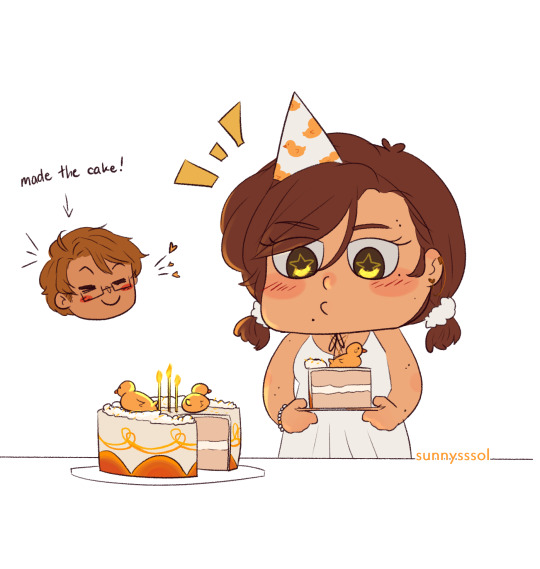
#their bday is august 30 btw !! so today for me#oc: susannah knightley#cc: alfred f jones#sol's writing#hws assistantverse#her cake actually looks good lowkey LOOOLLLL i'd like to think even the little duckies r edible!!! they're made out of chocolate :33#(alfred voice) call me juli4 ch1ld the way i be cooking! 🤓🤓🤓#HNSDDSVHJHDFJDSKFDF
26 notes
·
View notes
Text


After nearly a decade, I finally have a ref for Tagashei!! He means a lot to me, he's been around for so long. I feel like I haven't given him as much attention as Kisaki, but I am so happy to have this now! So here he is, the husband o(*°▽°*)o
As always, info below!!
Tagashei Hizarou
188 cm
Male
Demon
Usually quiet and chooses to keep to himself, but is highly irritable.
A watchmaker. He also enjoys other types of metal work.
Husband of Kisaki, and Alice’s father.
As a human, Tagashei struggled with heart problems. He passed not long after hearing about Kisaki’s (his at the time boyfriend) passing, almost as if he gave up at that moment.
During the Rapid Corpus arc, Tagashei is targeted by Mirror’s organization (due to him being close to Kisaki).
Mirror’s organization is sent out to kill Tagshei via the Rapid Corpus disease during a visit to a metal processing factory.
Tagashei’s biology mutated the strain, giving him new abilities. He became Mad Rabbit.
During the final arc, Tagashei learns about Limbo and finally understands Kisaki’s motives for being so secretive.
During their fight with Reflection of Mirror β, Tagashei (as Mad Rabbit) and Alpha Decay Kisaki form Monarchy of Hearts.
Tagashei can be absolutely brutal if need be.
Thanks to Kisaki, Tagashei’s new heart enabled him to develop the chamber responsible for magic production.
He specializes in manipulation- specifically anything relating to heat. He usually uses this to form metals in the ground into giant chains or spikes.
Later on, he learns he is capable of time magic. He is skeptical about using it though, usually only stopping time for brief moments.
Tagashei likes to dress somewhat fancy, clearly he is a fan of the steampunk look.
He wears his hat when he’s out of the house.
His eyes used to be grey as a human, now being a bright red with yellow pupils. Kisaki claims his eyes give off an intense heat when he is upset.
People do find it difficult to look him in the eyes.
His wedding ring was made by him! Of course he made a matching one for Kisaki too!
I'm attaching Mad Rabbit here too since I'll take any opportunity to show him off again (~ ̄▽ ̄)~

#oc#original character#oc tober#digital art#steampunk#leel's art#Tagashei Hizarou#GUYS#I am so proud of him#I'm not sure how to explain but working on this just.. Uwahhh#Feels nice to talk about Tagashei I definitely need to draw him more!!#Anyway yeah.. here he is!!#Handsome man.. angry father scary husband#I love him#I got tired of waiting to post so I'm posting him super early oops
25 notes
·
View notes